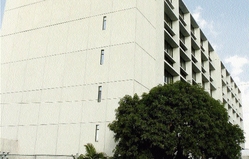No deal - Private-public sector debt partnership shelved
Published: Wednesday | August 19, 2009

A side view of the Ministry of Finance in Kingston, home of the treasury. - File
The closed negotiations with Jamaica's top banks and financial houses to restructure Jamaica's domestic debt that made Standard and Poor's so nervous, it cut the country's credit rating, has ended with no deal.
And the Government is also bowing, at least in part, to opposition pressure to bring new budget numbers to Parliament, one that reflects the country's true fiscal position, but while it plans to do so "early", it has not said when it will happen.
Finance Minister Audley Shaw said Tuesday that a proposal aimed at relieving the Government's short-term debt service costs was presented to the Government for consideration, but that Jamaica House thought better of the plan and has now shelved it.
"Discussions in the market about this initiative raised concerns about the Government's debt strategy," Shaw said in a short statement that had few details.
The Government has never said how much of the $675 billion of domestic debt was being renegotiated, but 18 per cent of the local debt stock becomes due this year.
Debt servicing
Shaw had budgeted $309 billion for debt servicing of the wider $1.2 trillion pool, including interest payments of $159 billion and amortisations.
"Cabinet, after careful consideration of the proposal and mindful of the uncertainty in the market, has decided that the Government will not be pursuing this proposal," he said of the negotiations, but proferred no explanation as to what elements went into Cabinet's decision, which sources said was taken at Monday's sitting.
Last night, sources said the Government may not have got the level of concessions it thought was needed to make enough of a difference. Persons in the know also saidthe Bank of Jamaica was never fully on board with the programme and that two banks and an insurance company remained holdouts to the end of the negotiations.
But Anya Schnoor, who speaks on behalf of securities dealers, says it may be that the Government, having done its own analysis, thought the risks outweighed the benefits.
Charles Ross of Sterling Asset management Limited said it was a good decision to throw out the plan, saying it would end up doing "more harm than good".
The rescheduling, he said, would basically kick the can down the road, lengthening the life of the country's debt, and amounted to a deferral of the inevitable.
Still analysts said last night that the Golding Administration's decision has landed it another problem - explaining to the IMF how it plans to manage the debt without a deal with its local bondholders and bankers.
There was no immediate word on what part S&P's action may have played in the decision, but two weeks ago when the world's leading assessor of the creditworthiness of sovereigns and corporates passed judgement on Jamaica, it created a firestorm with local brokers and the Government siding together against the rating agency, while the local political opposition said it underscored the weakness of Jamaica's economic team.
S&P took the negotiations with local banks as a sign that Jamaica was preparing to default on its debt, and warned that if a deal were cobbled it would pronounce it a technical default.
S&P too was concerned about the unchecked fiscal deficit - the excess in spending over revenue intake - that has deepened with each passing month, hitting $36 billion in May.
"The Government is taking the necessary steps to deal with its fiscal challenges," said Shaw.
"This will be reflected in the early presentation in Parliament of the Supplementary Estimates of Expenditure.
Jamaica owes US$6.3 billion or J$559 billion to creditors overseas, mostly bondholders who hold US$4.2 billion in Jamaica's debt as at June 2009.
Some 4.2 per cent of the external debt becomes due this fiscal year.
Shaw now seems to be banking on a deal with the IMF to turn around the country's flagging production base.
Contraction in the economy
Just this week, the Planning Institute of Jamaica reported a 3.9 per cent contraction in the economy for the June quarter and said the the September period would see a similar decline in GDP.
"Jamaica is currently in the process of finalising its macroeconomic programme to take account of the effects of the global situation on the country and to adjust accordingly to ensure stability in the economy," said Shaw.
"The proposed standby agreement with the International Monetary Fund will ensure stability in our balance of payments."
business@gleanerjm.com

Finance Minister Audley Shaw and Prime Minister Bruce Golding. - File






















